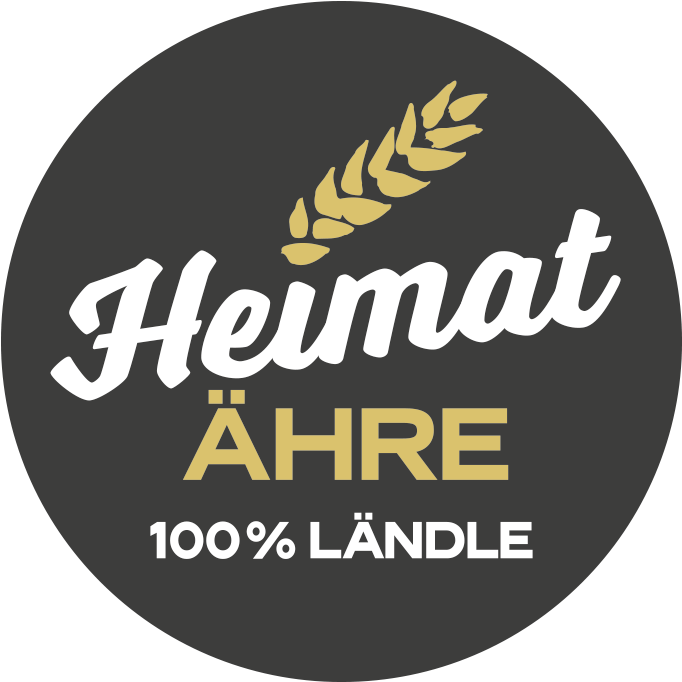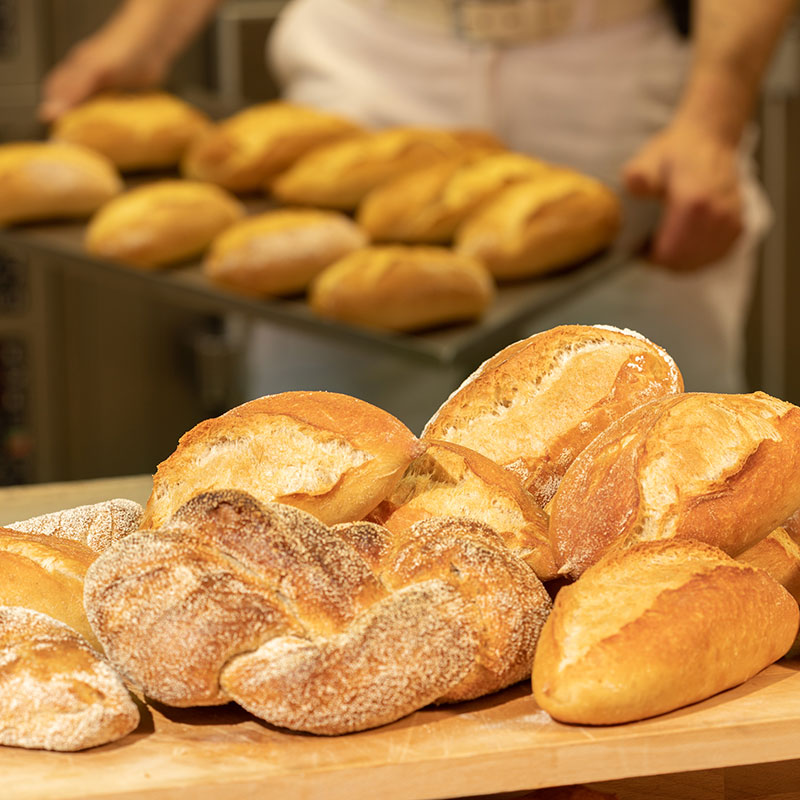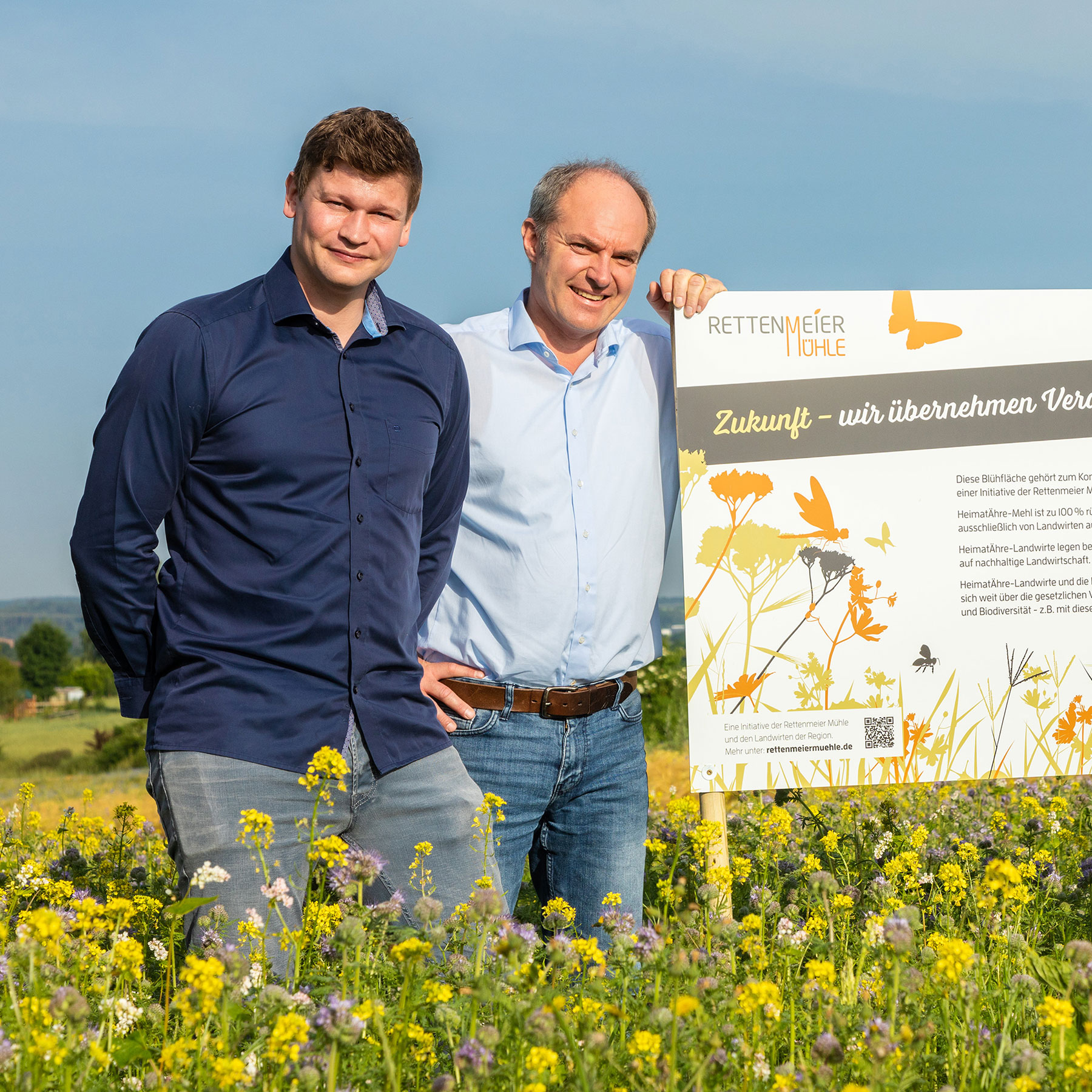HeimatÄhre – 100 % Ländle!
Transparent. Safe. Genuine.
Our regional concept “HeimatÄhre” combines the best of Baden-Württemberg, nature and responsibility. Regional grain cultivation and traditional baker’s craft – two of the same kind. With full transparency and maximum security. For you as an artisan baker.
Wheat and spelt for our HeimatÄhre flours come 100% from Baden-Württemberg, and soon all rye as well. Provided, of course, that the quantities corresponding to our quality standards can be harvested. Here, too, for us – and thus also for you – nothing beats sustainable quality, an honest exchange with you for a secure craft future.


HeimatÄhre – 100 % Ländle!
Transparent. Safe. Genuine.
Our regional concept “HeimatÄhre” combines the best of Baden-Württemberg, nature and responsibility. Regional grain cultivation and traditional baker’s craft – two of the same kind. With full transparency and maximum security. For you as an artisan baker.
Wheat and spelt for our HeimatÄhre flours come 100% from Baden-Württemberg, and soon all rye as well. Provided, of course, that the quantities corresponding to our quality standards can be harvested. Here, too, for us – and thus also for you – nothing beats sustainable quality, an honest exchange with you for a secure craft future.

The cornerstones of our “HeimatÄhre” quality promise:
- We support regionally and transparently produced baked goods of the highest quality and absolute freshness from artisan bakeries.
- Our HeimatÄhre flours are made exclusively from wheat and spelt grown in Baden-Württemberg. We purchase over 95% of our grain from the same suppliers every year.
- The grain for our HeimatÄhre products comes from resource-saving, sustainable agriculture in the region – we do not know long transport routes.
- Our flours have consistently high baking properties.
“HeimatÄhre” is not just lip service, but a commitment to our homeland. Not only we as a flour mill, but more and more tradition- and environment-conscious bakers and consumers pay attention to quality as well as to the origin of their ingredients and foodstuffs … and not only to the price!
Closing ranks with local farmers
Together with our regional farmers, we as a mill take responsibility and make an active contribution to nature conservation and the preservation of biodiversity.
We carefully select the grain for our flours. We accompany it from sowing to harvesting. Our cultivation advisors exchange ideas closely with our partners in agriculture and discuss specialist topics such as fertilization, plant protection, crop rotation, biodiversity, quality, etc.
Our mission at the mill?
To turn healthy, ripe grain into high-quality flour. This applies to the entire HeimatÄhre milling process: first the multi-stage cleaning of the respective grain, then the milling, sifting and careful breaking up of the grain kernels, up to the final stage in the so-called passage, where the crushed grain components are refined into meal, semolina, haze and flour in ever more closely meshed sieves. State-of-the-art technology, responsible use, full transparency.
The result? Unique flour, no unnecessary additives, and the HeimatÄhre mark as proof of regional origin and unique quality. Your customers appreciate that. And it pays off for you as an artisan baker: Short distances, most valuable grain, sustainability, regional – for a strong craft and bread variety.
HeimatÄhre as a Ländle pioneer
HeimatÄhre goes one step further, especially for our Ländle: Together with our farmers, we create large flowering areas that last far beyond the harvest period. With this pilot project, we create habitats for fauna and flora and contribute to the preservation of biodiversity.

Your HeimatÄhre bakers
FAQs
We answer the most frequently asked questions about our “HeimatÄhre” regional concept here. If you have any further questions, please feel free to send us an e-mail.
What does "HeimatÄhre" mean?
A clear commitment to the region, to craftsmanship and to sustainably produced food. Since we know almost all of our partners in agriculture and the regional grain trade personally and maintain close contact with them, “HeimatÄhre” is an obvious idea for us that we have consistently thought through further.
To this end, we not only visit our partners sporadically, but also regularly exchange information on site.
Our cultivation advisors follow the production cycle of the grain from sowing to harvesting, always at the side of the farmers, whom we advise or support in the selection of varieties, in cultivation-related questions, in plant protection measures and in the harvesting of their crop, if requested.
We even support our farmers in transporting the harvested grain to our mill, if desired. In this way, the grain remains in the region during the harvest season.
Where does our grain come from?
The wheat and spelt that we process at Rettenmeier Mühle come exclusively from Baden-Württemberg.
In the case of rye, we have not quite reached this goal yet. However, due to the intensive cooperation with the partners in the value chain, we are sure that we will reach this goal soon.
Which cereals are grown in the "HeimatÄhre" quality program?
Classic bread cereals:
- Common wheat
- Spelt
- Rye
Which mills process and sell grain from the "HeimatÄhre" quality program?
In Baden-Württemberg, only Rettenmeier Mühle processes grain with the “HeimatÄhre” quality designation and adheres to the strict guidelines. In Bavaria, Bavaria Mühle produces “HeimatÄhre” milled products according to the same concept. In addition, the Black Forest Mill is also allowed to sell “HeimatÄhre” ground products under this label.
Who may participate in the "HeimatÄhre" quality program?
Only farms that work according to the “HeimatÄhre” growing and purchasing guidelines and whose grain grows in selected fields in the region.
What are the obligations of the farmer?
Our farmers and grain trading partners are committed to acting in accordance with state-of-the-art agronomic and best environmental practices as part of our quality program. These include consideration of
- sustainability
- conservation of resources
- preservation of biodiversity
- selection of optimal and healthy crop rotations
- lowest possible use of fertilizers and pesticides
What obligations do we assume as a mill?
Together with the farmers, we develop and give variety recommendations.
On request, we provide the farmers with expert advisors who are available to answer all qualitative and cultivation-related questions.
We provide free transport capacities during the harvest.
With our large collection capacities we help to reduce the distances of the grain from the farm to the processor to a minimum.
We compile the optimal grain mixtures and mill them according to the quality requirements and recipe specifications of our customers, and we do this with the highest quality standards that go far beyond the legal requirements for hygienic and technological standards.
We ensure a stable and, above all, consistent quality of our grain products by means of fully automated process control, monitoring and steering.
With our flowering area project, in which we plant flowering areas several meters wide in cereal fields in close partnership with our farmers, we are setting an example for the preservation of biodiversity.
How safe is our "HeimatÄhre"?
We verify compliance with the “HeimatÄhre” growing guidelines by regularly visiting farms, fields, and storage facilities.
We inspect and evaluate each lot delivered to the mill for quality, sensory, and most especially for any impurities.
We have a fully equipped grain and flour laboratory at our milling facility and thoroughly inspect every grain delivered.
We conduct regular contaminant testing for pesticides, mycotoxins, heavy metals and other residues and contaminants.
We only use transport companies that have been inspected by us and certified according to GMP+.
How can I tell if I am buying a product from the "HeimatÄhre" quality program?
The following label identifies products from the “HeimatÄhre” quality program:

Participating bakeries display the label as well as the certificate of participation in their sales outlets.
Participating bakeries may use the label after verification, if desired.
What distinguishes baked goods from the "HeimatÄhre" quality program from others?
The customer buys “HeimatÄhre” baked goods with a clear conscience because …
… they are regionally and transparently produced foodstuffs that have their origin in a cooperative partnership between producer, mill and baker.
… a “HeimatÄhre” baker attaches great importance to the quality of his raw materials, their safety and self-contained regional production and supply chains.
… he can also fully identify with our project “Flowering areas to preserve biodiversity”.
… the CO2 footprint for these quality baked goods is small due to the short transport routes and the low turnover of goods.
